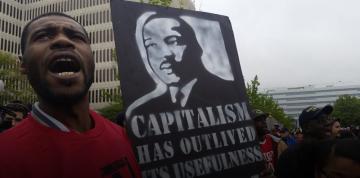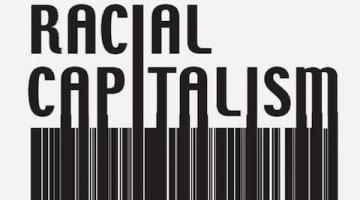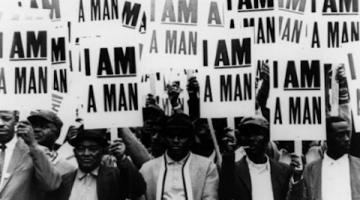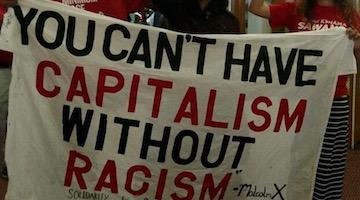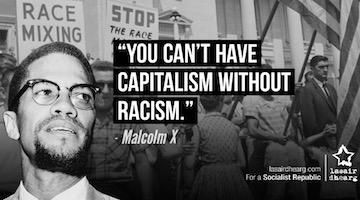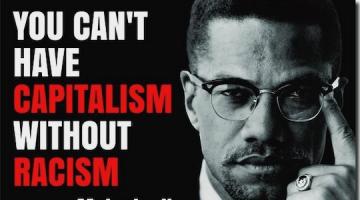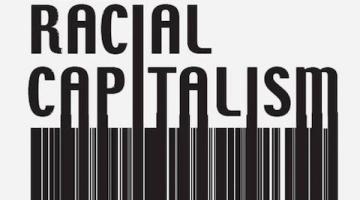Oprah gushes that this book by the latest darling of the ruling classes might “save us,” but all it’s really trying to save is capitalism.
“Wilkerson’s understanding of caste is not as a scholar, but as a dilletante and amateur.”
A New York Times reviewer called Isabel Wilkerson’s new book Caste: The Origins of Our Discontent “an instant American classic and almost certainly the keynote nonfiction book of the American century thus far.” It is neither. Oprah says it "might well save us." It won’t. It is a book in this Time, it is not for this Time; by which I mean it neither understands the magnitude of the crisis of our Time, nor the way out of it. Designed to erase race as the central category explaining the American crisis, it also dismisses class, the Black proletariat and the larger working class. In the face of 60 million working people unemployed, underemployed or completely removed from the labor force in this COVID 19 driven depression, Wilkerson’s arguments turn attention away from actual racial and class conditions, to a non-material and made-up reality she calls caste. Moreover, she misguidedly substitutes an ill-conceived caste analysis for class analysis; the extreme of petit bourgeois obscurantism. Rather than the real and actual material conditions of the life worlds of the people, Wilkerson makes beliefs, values and ideas her central focus. In the name of caste, she flips reality on its head, from working people to their alleged deeply held beliefs; beliefs so deep in their consciousness that they seldom recognize them. Such analysis works in polite parlor discussion, or in university faculty lounges, but is completely meaningless to the lived experiences of Black folk and workers.
The book says nothing particularly new; it is intellectually lazy and social scientifically superficial. Because the theory doesn’t work and explains very little if anything in the current crisis, she uses anecdotes, ad nauseum, as evidence of an identity between the Indian caste system and the US race/class system. These stories tell us very little we don’t already know but demonstrate the horrors of the modern capitalist race/class system.
“In the name of caste, she flips reality on its head.”
Admittedly, all systems of oppression and exploitation have common characteristics, but comparisons between the 7000-year-old Indian caste system does little to explain in depth modern US racial capitalism. The race/class system in the US arises with capitalism and in important ways makes its rise possible. The Indian caste system arose from completely different modes of production and different social class conditions and at a different epoch of human Time. If she wished to comparatively study caste and its origins, she might have been better served studying the caste systems in Ancient Egypt, and other parts of Africa; or maybe the systems in Ancient Persia or Abyssinia. But she superficially ties the modern capitalist system to an ancient precursor and the US and Nazi Germany to India.
Wilkerson says the US “caste system” has three castes, the upper, the lower and the middle. In some ways this sounds like the superficiality of liberal US class analysis during the Cold War, the three-class division. The upper caste is the white majority, the lower caste is the Black minority and the middle caste are “Hispanics” and Asians, striving to make it into the upper caste. The white majority are the equivalent of the Indian Brahmin upper caste and Black Americans are the equivalent of Indian Dalits (Untouchables).
Insult is added to injury when Wilkerson includes in the American upper caste the entirety of the white working class and poor. If at no other moment in her work, it is here that its absurdity is revealed; and the ludicrous essence of her caste analysis, void of any even minimal effort to include something of class analysis stands out.
“She superficially ties the modern capitalist system to an ancient precursor and the US and Nazi Germany to India.”
The book’s arguments go back to the middle 1940’s and the white establishments’ efforts to whitewash race from social discourse. The reason was to prevent the idea being used for proposes akin to the ways Nazism did. Gunnar Myrdal and Ashley Montague, well-meaning liberals, led the charge. Myrdal’s massive study of race An American Dilemma wrestled unsuccessfully with the crises of racial oppression and how to save liberal democracy. Du Bois, Oliver Cromwell Cox and a cadre of Black social scientist had concluded the race problem remained the problem of the 20th century and could not be disguised by using other language. Furthermore, they concluded that racism and capitalism were so intimately connected that racial oppression could not be resolved without eliminating capitalism; socialism as a system, they reasoned, was necessary to resolve the crisis of what had crystalized into a white supremacist social system. Myrdal and other establishment white liberals could not go that far and hold on to support from ruling class foundations and politicians; the paradox was they could not have it both ways, racism and imperialism, on the one side and democracy on the other. In the end, the liberal model collapsed, as Wilkerson’s does. The search for a new vocabulary about race and racial inequality is no substitute for a new economic and political order; neither is Wilkerson’s call for “radical empathy.”
Wilkerson writes “The issue of caste was, to my mind, the basis of every other ism.” She, and what she calls her tribe, wish to “see past the hierarchies and false divisions that undermine the species”, and thus, get to the heart of matters. What she calls “false divisions” are actual and historically constituted ones rooted in the capitalist mode of production. The divisions between slaves, slave traders and slave owners are not false, that between workers and capitalist is real, as are the divisions between the billionaire class and rest of us. Yet, Wilkerson insists, our lived experiences with race, class and gender are but manifestations of deeper mechanisms of oppression that we don’t directly experience. These unseen mechanisms are what produce false divisions and specifically race and racial hierarchies. Wilkerson argues that race discourse and research must move from race to caste, from material relations of race and class oppression and exploitation to beliefs, values and ideas. Caste, she argues, was implanted in the US with its founding and has endured all the changes in the racial order from slavery through Jim Crow and to the present.
“What she calls ‘false divisions’ are actual and historically constituted ones rooted in the capitalist mode of production.”
Wilkerson connects Nazi Germany and the US as examples of caste systems. It is correct to connect them, but not for the reasons she gives. Germany, the US, Britain, France, Belgium and other Western capitalist nations have much in common as imperialists and racist societies, which colonized most of the world and carried out multiple genocides and wars. They all participated in the trans-Atlantic slave trade and slavery. To explore this linkage might start an investigation of the current crisis, the lived experiences of this crisis by billions of people worldwide and the possibility of fundamental and liberatory change. Such an investigation would bring into question capitalism itself and the necessity of a systemic alternative to it. To go there would deprive Wilkerson and this book of the gushing support both receive from the ruling elite.
Sight should not be lost of the consequences of this theory on peoples’ struggle. By claiming that deep and unrecognized (and perhaps unknowable) beliefs and mechanisms control us, Wilkerson is arguing that struggles in the past and today against “false divisions” ultimately will not lead to freedom. Even the end of capitalism, imperialism and racism, will not end caste oppression.
Wilkerson’s understanding of caste is not as a scholar, but as a dilletante and amateur; looking at the
book’s bibliography she hardly knows where to start. In terms of India her ideological predisposition mirrors the British colonialists, who argued that India had little real history, that for thousands of years it was static, and India needed British rule to reenter history. Wilkerson, however, writes as though history is not relevant. Time as a central category for understanding human institutions, civilizations and humanity itself is absent. For instance, when talking of India or America she ignores the struggles against oppression. The long history and the dynamics of resistance to all forms of oppression in India include the Buddhist rebellion (5th century BCE), the anti-colonial struggle, the struggles against poverty, the Dalit resistance and those of workers and farmers currently are not mentioned. If Wilkerson addressed actual history, it would shift her narrative from talking about the constancy of victimhood to the dialectics of resistance and freedom. The other absence is no discussion or even recognition of political economy, that is, the modes of production, the ways people make livings and the contradictions therein. Just taking Wilkerson’s argument about caste at face value, the economic foundations of the Indian system and that of the US are completely different and occur in vastly different historical conditions. In these respects, Wilkerson’s project ends up as a parody and a caricature of scholarship.
The book’s subtitle references “our discontent”, however, it is ultimately about the discontent of a ruling elite trapped in the throes of ideological malaise and scrambling for a way to hold on to power. The crisis is systemic and existential. In the face of this, the ruling class turns to fake answers and delusional ideas, ideas that obscure reality. It can abide a change in the language of oppression, like those found in books by Robin DiAngelo and Ibram Kendi, but not a change of the system of race/class oppression. Unable to fully process the crisis of its rule and its memento mori (reminder of death) moment, it turns to self-help anti-racism cures and denial of the race/class foundations of the crisis. This zeitgeist gives birth to Wilkerson’s unsuccessful theory, but not to a way out of the crisis. But why now?
“When talking of India or America she ignores the struggles against oppression.”
A new technological revolution is underway, what is called the Fourth Industrial Revolution. Black labor, and most labor, is becoming increasingly unnecessary. As such, a new and more sophisticated attack upon working people is underway. They are not just unnecessary and superfluous, but they are being attacked as degenerate beings, as less than human. White workers are being defined as congenitally racist, whose very beings degrade society. These attacks are financed and promoted by the tech giants like Google, FB, Twitter and Microsoft, capitalists who stand to make hundreds of trillions in profit from the new technology, that will make tens of millions of working people unnecessary, unemployed and impoverished. Moreover, any resistance by especially white workers will ahead of time be defined as racist. The working class will in this scheme be reduced to slave-like conditions and imaged as backward and dregs upon society. Hence, it is quite understandable that the cofounder of Twitter donated $10 million to Ibram Kendi’s alleged anti-racist institute, where it’s argued that Black people and Black workers are racist; or that Robin DiAngelo’s book White Fragility is favored in corporate board rooms and business schools, due to its attacks upon the very being of white workers. Add Wilkerson’s book to the list of books that prepare the way for an all-out assault upon the working class in the interest of the Fourth Industrial Revolution and a profit bonanza of hundreds of trillions of dollars.
Oprah insists this book “might save us all”, the “all” she’s referencing is the ruling elite. Oprah is not interested in saving working people from the ravages of the Fourth Industrial Revolution. Nor do I think that capitalists of Silicon Valley, transnational banks and financial institutions and the political order that fronts them can be saved from the fire this time, fueled by the anger and resistance of working people of all colors. 2020 is a moment of truth for all sides; in this moment of struggle, political and ideological clarity must be uppermost as we the people fight for our common future.
Anthony Monteiro is an organizer with Philadelphia’s Saturday Free School, a Du Bois scholar, a community educator, a radical and activist.
COMMENTS?
Please join the conversation on Black Agenda Report's Facebook page at http://facebook.com/blackagendareport
Or, you can comment by emailing us at comments@blackagendareport.com


